- Home
- Ian Mcewan
The Ploughman’s Lunch Page 5
The Ploughman’s Lunch Read online
Page 5
Our two minute sequence is presented to represent an hour of film. When at last it is over and the lights come up, there is a moment of stupefaction. Susan yawns and prepares to leave.
SUSAN. Do you think she’s invited you up for her sake or for mine?
JAMES (kissing Susan’s fingers). I haven’t really thought about it.
SUSAN (smiling, mischievous). Well, you should.
James kisses Susan. She complies rather than responds.
Susan disengages herself gently and gathers her things. She stands.
Well, must get on.
58. Interior. Newsroom. Early morning.
A day or two later. People are drifting out to go down the corridor to the morning news conference. James is one of the last to leave. On his way out he meets Charles, the newsreader from Scene Two.
JAMES. Charles! I didn’t know you were back. Have a good holiday?
CHARLES. Not too bad, thanks. How have you been?
JAMES. Working hard on that book I was telling you about. Coming to the meeting?
CHARLES. I’m not sure I can face it.
JAMES. Keep me company.
59. Interior. Corridor. Early morning.
James steers Charles out of the newsroom and along the corridor. Only slowly does it become apparent that Charles is in a state of distress.
JAMES. How’s Mary?
CHARLES. She’s fine. Well, actually we’ve broken up. It’s all over.
JAMES. No. That’s terrible, Charles. What happened?
CHARLES (on the edge of tears). Look, I’d rather you didn’t ask me questions. I can’t talk about it.
They have reached the News Conference Room, but Charles walks on down the corridor to nurse his grief out of sight.
60. Interior. News Conference Room. Morning.
The News Conference Room. Ten minutes later. The same Editor. The same matter-of-factness and slight boredom.
EDITOR. . . . as it happens they got all their facts wrong anyway. I checked up. We reported the big peace march on Hyde Park last October, and a march on NATO headquarters in the spring, and the death of whatsisname last month, the old CND man . . .
He looks round. It is not clear that anyone is listening.
What really gets to them, though they’ll never admit it, these types, is that we give both sides, theirs and the government’s. Multilateralists and unilateralists. Hawks and doves. As far as they’re concerned, there’s only one side to the question. Nuclear weapons are bad. Full stop. End of discussion. Anyone who says there’s more to it than that is . . . what was it . . .
(He picks up a newspaper cutting.)
‘under cover of an authoritative news service, propagating a military definition of reality.’
He pauses, relaxes into professional indifference.
Still. With the party conferences coming up in the autumn there’s bound to be some action on that front and we’d be doing something anyway. It won’t all be Falklands business. James, is there something in there for us, if we could tie it in with something else?
JAMES. Well, it’s all a bit cranky and small scale. Vegetarians, hippies, disturbed housewives. Local radio story, I’d say, if that. They’re mad.
EDITOR. Oh well. Just an idea. Now. Can we talk about this radio-car cock-up yesterday. Chris?
61. Interior. Newsroom studio. Late morning.
Two hours later. The studio. James and Charles sit at the table, as in Scene Three. Charles reads. He is obviously distressed but his voice remains under control. James watches anxiously.
CHARLES. It was an emotional occasion. Hundreds of small craft led by six fire tugs making fountains of water formed an escort flotilla, and four Wasp helicopters flew past in salute. In the City the Financial Times Ordinary Shares Index was down ten points an hour ago at 529.8. BBC Radio News.
In the Control Room, the minute hand of the clock reaches five past the hour; the sweep hand reaches the twelve on Charles’s last word. The Controller pushes a button. Charles slumps forward.
JAMES. My God that was close! Well done, Charles. I knew you wouldn’t let me down. But God! We almost didn’t make it.
James is standing, gathering papers. He bustles out, indifferent. We close in on Charles. Unseen by anyone, he is just beginning to cry.
62. Interior. James’s flat. Evening.
James is typing rapidly. There is a growing pile of typewritten sheets to one side. We go over his shoulder and look closely at the map, Egypt, the desert . . .
63. Exterior. The Barrington house, Norfolk. Late morning.
A few days later. James has just arrived and switched his engine off. But for the wind and birdsong, silence.
There is no reply when he tries the front door. A note pinned to the door reads: ‘Gone for a walk. Follow footpath. Susan.’
64. Exterior. Dyke. Day.
James walks along the dyke, across the marshes. Below him, on the sand, in the distance, are two figures. James stops to watch them. Matthew and Susan are deep in conversation—evidently a serious matter. They seem to be making an agreement. Matthew puts his head on Susan’s shoulder, and they walk on, unaware of James.
65. Interior. Dining-room. Night.
A burst of laughter. It is dinner. Seated are Ann, Matthew, Tom, Susan, James and Jacek, a professor from Central Europe, mid-sixties, an old friend of Ann’s. Betty, the housemaid, serves.
JACEK (heavy accent). The second is less pleasant. A Pole is confronted by a German and a Russian soldier. Which should he shoot first? The German first, the Russian second. Duty before pleasure.
A more subdued response.
TOM. I’ve heard that one at school.
JACEK. Then you are a well-educated young man. (To Ann.) Tom has been reciting his English kings and queens to me.
JAMES. And to me.
JACEK. Haven’t you socialist historians in the West made kings and queens out of date in schools?
ANN. We keep trying.
MATTHEW. I can tell you that the history of the monarchy is alive and well in the national memory. I shot a commercial—a series of vignettes of kings and queens—Henry VIII, Mary—
TOM. Elizabeth I.
MATTHEW. Elizabeth I, and so on—and we had a fantastic response.
SUSAN. What were you advertising?
MATTHEW. Oh, some new lager.
JACEK. I’m pleased to hear that there is at least some national memory. I agree with Ann that the British forget too quickly. Here you have enviable freedoms, and yet no monuments to those who struggled to win them for you. Now that is why I think there is hope for the Poles, whoever occupies their country. They remember their dates, and they keep adding to them. December 1981, Gdansk 1980, 1976, 1970. Katyn 1940, 1922 and so on. It’s a subversive list. Say it out loud on the streets of Warsaw and you might get arrested.
During this last speech of Jacek’s we see James trying to catch Susan’s eye. She glances up and looks away.
66. Interior. Stairs. Night.
An hour later.
Wine glass in hand James goes upstairs. He comes to Tom’s room.
67. Interior. Tom’s room. Night.
Susan has been seeing Tom into bed.
James watches from the doorway. She kisses her brother and turns out the light.
TOM. Don’t close the door. Don’t turn out the hall light.
SUSAN. I won’t. Goodnight.
TOM. ’Night.
James and Susan linger in the semi-darkness outside Tom’s room. From downstairs comes the sound of boisterous conversation.
JAMES. I haven’t seen much of you.
SUSAN. No. It’s a bit of a madhouse. For some reason a lot of my mother’s friends specialise in monologues.
JAMES. He’s all right, the professor.
Tom comes out of his room.
TOM. Ah, Susy, it . . .
SUSAN. Tom . . . bed! Go on.
Tom retreats into his bedroom. James and Susan move to the head of the stairs.
JAMES. Look, will you come on a walk with me tomorrow?
SUSAN. I might.
JAMES. Might?
ANN (calling from below). Susan, James, are you up there?
SUSAN. Hello, Mummy.
Ann comes half-way up the stairs.
ANN. Betty’s made some coffee. Do you want some?
SUSAN. Yes, we do.
ANN. Well, we’re in the library.
Ann lingers a moment. She wants James downstairs. As soon as she has gone, he kisses Susan.
JAMES. Might?
SUSAN (strokes his face). Yes. Might. Remember, you’re here to talk to my mother.
She leads the way downstairs.
68. Interior. Library. Night.
The library. A fire burns. Ann pours the coffee and is highly aware of James when he comes in. Jacek is a little drunk.
JACEK. Ah, Susan, James. Come and judge. I am interrogating Matthew. I am asking him how a director of advertisements and a socialist get along so well together. How does the lion lie down with the lamb.
ANN. By staying in town all week. And lying down with several lambs.
MATTHEW. Not so. We meet half way. Ann has grown very fond of her material comforts. She even owns land with keep out signs posted on the boundaries. And I . . .
ANN (wearily, to James). I bought a wood because a local farmer was going to cut it down. The signs were already there.
JACEK. And you . . .
MATTHEW. I earn so much money at what I do that I can’t even begin to defend it. I used to shoot a whole line about the value and necessity of advertising . . .
ANN. You were more interesting then.
MATTHEW. . . . but now I’m an agnostic. So is Ann, if she’d only admit it.
ANN. Come on, James. Defend me from this tripe.
Expectant pause. Susan smirks. James is out of his depth.
JAMES. Well, there’s no reason why a socialist shouldn’t like comfort, or own a wood, or be very rich. The problem is making all that available to everybody . . .
All except Ann groan dismissively.
MATTHEW. Rubbish!
JACEK. Ah, if everybody is to have everything, then you need to plan very carefully, you need to control the future. This is the tragedy of Marxism. The future is not ours to control, nothing turns out as we plan it. (To Ann.) You remember that charming note of Enzensberger’s, quoting Hobsbawm? A congress of Spanish anarchists in 1898 looked forward to a glorious future after the revolution—a world of incredibly tall shining buildings, with elevators that would save climbing stairs, electric light for all, garbage disposal chutes and wonderful household gadgets. This vision is now a reality in our cities, the victory has been won and it looks just like defeat . . .
Susan yawns conspicuously. Everybody turns.
SUSAN (unrepentant). Sorry. Tired.
69. Interior. Kitchen. Morning.
The following morning. If possible, a beautiful day. Betty is washing up a large pile of breakfast things. From outside, the sound of much hilarity.
70. Exterior. Garden. Morning.
On the back lawn Tom, Susan and Matthew are playing football. To one side, Jacek leans on his stick and watches.
71. Interior. Library. Morning.
The library. Ann and James sit facing each other by the fireplace. The game of football can be heard. From where James sits he can see past and into the gardens, the occasional glimpse of Susan, the enticing sunlight.
ANN. The references are to Hansard or to newspapers. I haven’t got the actual speeches now. You’ll have to chase them up.
JAMES. I will, thanks.
ANN. These are transcripts of various radio broadcasts, including Gaitskill’s, the one they tried to stop. You ought to have that . . .
Betty knocks and enters.
BETTY. Excuse me. Phone call for Mr Penfield.
ANN. Take it here.
JAMES. Thanks. Hello . . . how did you get this number? I see. Look, I’m really sorry about last week, I . . . no, I’m up here researching something I . . . is she? . . . well, don’t they have painkillers for that? . . . Oh, yeah . . . Look, tell her I’ll be there . . . I can’t just drop everything. It’ll probably be the day after tomorrow . . . Right . . . Ok . . . yes, goodbye. (To Ann.) It’s a relative of mine. She’s not very well. (He sits down again.) I’m sorry. What were you saying?
72. Exterior. Garden. Day.
A couple of hours later. Susan sits on a bench re-tying the lace of her walking boot. James stands, waiting.
SUSAN. Jeremy phoned this morning.
JAMES. What did he want?
SUSAN. He’s making plans for Brighton. He thought we could travel down together.
JAMES. That’ll be fun.
SUSAN. In your car.
JAMES. Why not.
Ann appears from the house. Tom follows.
ANN. Hello. Anyone for a walk? Tom isn’t, I can tell you.
JAMES. Well, we were just . . .
SUSAN. Don’t you want to walk, Tom?
TOM. No.
SUSAN. Actually, I’ve been once today already. I’ll stay here with him.
ANN. James and I have been indoors all morning.
SUSAN. Well, he’s very keen to go.
She walks with Tom towards the house.
JAMES. Susan . . .
Holding Tom’s hand, she turns and smiles.
SUSAN. See you when you get back.
James has been quickly outmanoeuvred by Susan. He stands awkwardly for a moment, collecting himself.
ANN. Shall we go?
JAMES. Yes.
73. Exterior. Dyke. Day.
The dyke across the marshes, the sand dunes, the sea. During Ann’s monologue (broken up where appropriate) we see the two sometimes in close, sometimes as minute figures in this immense landscape.
James follows Ann along the dyke.
They stop and she points out a wooded hill, well inland.
Later . . .
ANN. Then I began to listen to what the well-off were saying about the poor now—the war had just ended, and the language was much the same as it had been before the first Reform Act. A small minority thought that England was really theirs, they had made it, they owned it. The rest, the wage earners, were foreigners, outsiders intent on wrecking it all.
JAMES. Didn’t Evelyn Waugh say that the country under Atlee seemed to be under enemy occupation?
ANN. Did he? I left school and worked for the Labour Party. My older brother, George, had just been killed in Greece, and he’d been an active member. I hero-worshipped him. He was 25 years old . . . (She trails off.) It was an exciting time for us, those first couple of years after the war. We thought the country was about to become a true democracy. I can understand why people of your generation want to write about that time. They feel betrayed. They want to know what went wrong.
JAMES. What went wrong?
ANN. Oh, many things. Inertia . . . Stalin and the Cold War . . . a failure of nerve. We took the seediest, most inefficient fifth of the economy into State care, paid out millions for it, put the same old duffers in charge. A new broom with very old bristles. When the Tories were returned, I went and sat in the BM and wrote my little book on Chartism.
Later. Walking home.
I don’t like admitting it, but the truth is, I am happy. Matthew’s right. I like comfort. I like doing my own work and not having to teach. I love my house and the garden, and my wood. (She stops.) And I’m very happy walking here with you. (She takes his hand.) You have such a quiet, strong sense of purpose. Energy. I think I’ll rely on you to take the uncomfortable stands in life. I’ve done my bit.
They smile at each other.
Ann moves in to kiss James passionately. He complies.
A jet fighter flies in low over the marshes.
74. Interior. Drawing-room. Evening.
Susan and Tom, who wears pyjamas and dressing-gown, are playing chess. James watches Susan. Tom is noisily, bossily instructing her in the rules. Matthew
is approaching James, about to speak.
MATTHEW. I just might give you a ring when we get back to London. There’s one or two things I’d like to . . . Will you let me have your number before you leave? Have you ever watched a commercial being made?
JAMES. No.
MATTHEW. Well, it’s worth seeing.
Ann appears in the doorway.
ANN. James . . .
There is a moment of awkwardness. James squeezes past Matthew and goes towards Ann.
JAMES. Excuse me.
75. Interior. Library. Evening.
The library. A moment later. James has just come in. Ann hands him a silver framed photograph.
ANN. I wanted to show you. It was taken six months before he died.
The resemblance between James and the dead brother should be clear. James studies the photograph. He looks up. Ann is gazing at him steadily.
76. Interior. Dining-room. Night.
Half an hour later. Ann, Matthew, Susan and James. A certain strain. The sound of knives and forks only.
In the hall the phone rings. They hear Betty pick it up.
Still holding the receiver she pushes open the dining-room door.
BETTY (to Matthew). It’s for you, Mr Fox.
The others go on eating, acutely aware of Matthew’s conversation.
MATTHEW (from the hall). Hello . . . Oh, hi . . . well, you know . . .
He pushes the door shut with his foot.
James looks at Susan.
Susan glances at her mother.
Ann knows it is one of Matthew’s girlfriends. She goes on eating, a brave but failing attempt to appear untouched.
77. Interior. James’s bedroom. Night.
Very late, the same night.
From the point of view of an intruder we move into the room. James is asleep.
ANN’S VOICE (whispers). James . . . James.
He snaps awake. We see what he sees. Ann sits on the edge of his bed, in tears.
She touches his face.
She leans over and embraces him.
78. Interior. James’s bedroom. Night.

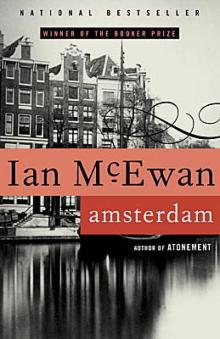 Amsterdam
Amsterdam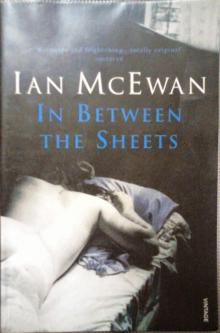 In Between the Sheets
In Between the Sheets Atonement
Atonement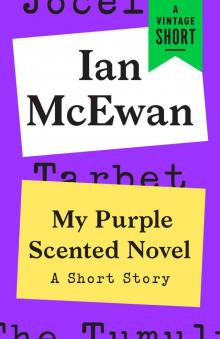 My Purple Scented Novel
My Purple Scented Novel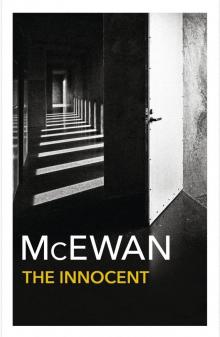 The Innocent
The Innocent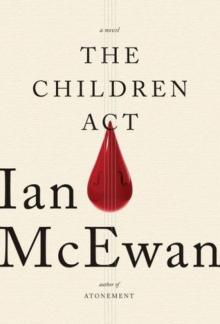 The Children Act
The Children Act Enduring Love
Enduring Love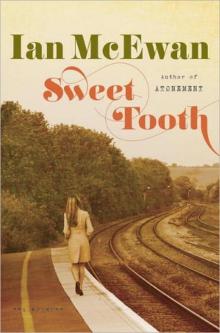 Sweet Tooth
Sweet Tooth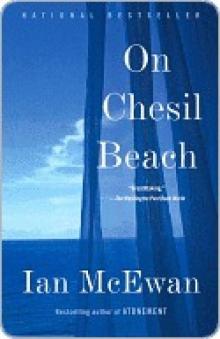 On Chesil Beach
On Chesil Beach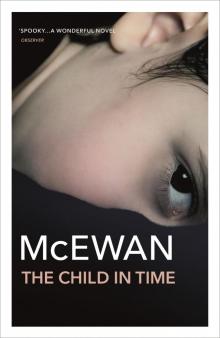 The Child in Time
The Child in Time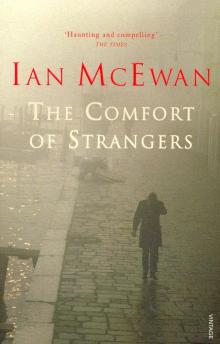 The Comfort of Strangers
The Comfort of Strangers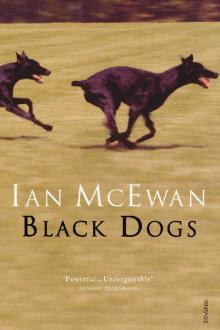 Black Dogs
Black Dogs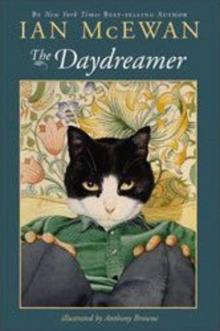 The Daydreamer
The Daydreamer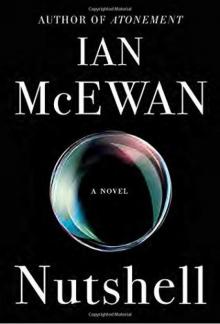 Nutshell
Nutshell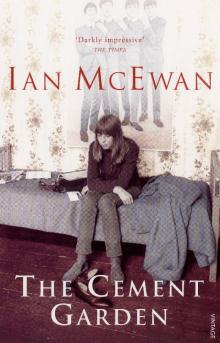 The Cement Garden
The Cement Garden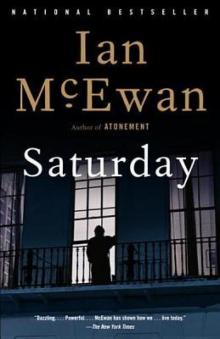 Saturday
Saturday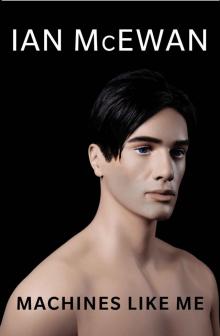 Machines Like Me
Machines Like Me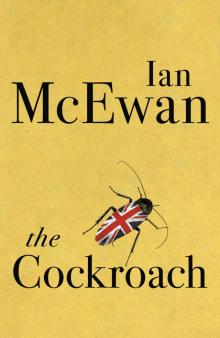 The Cockroach
The Cockroach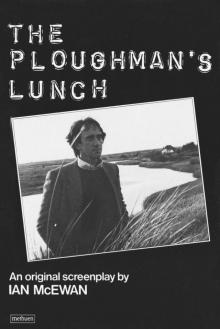 The Ploughman’s Lunch
The Ploughman’s Lunch